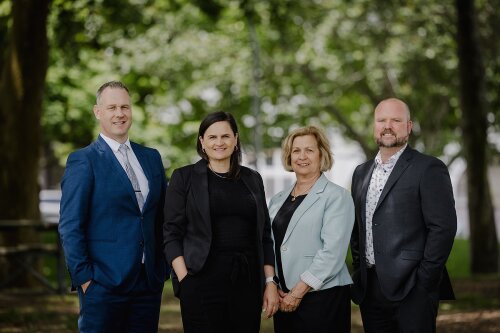Best Guardianship Lawyers in Cambridge
Share your needs with us, get contacted by law firms.
Free. Takes 2 min.
List of the best lawyers in Cambridge, New Zealand
1. About Guardianship Law in Cambridge, New Zealand
Guardianship law in New Zealand governs who can make personal and welfare decisions for someone who cannot do so themselves. In Cambridge, which sits in the Waikato region, residents follow national statutes and NZ court procedures. Local practice aligns with the Family Court and District Court processes used across the country. A Cambridge solicitor or barrister can guide you through applications, hearings, and duties as a guardian or administrator.
The core framework covers both guardianship for adults who lack capacity and guardianship arrangements for children under the Care of Children Act 2004. The Protection of Personal Property Rights Act 1988 provides for guardianships and administration of personal welfare and property where needed. These acts establish who may be appointed, the scope of powers, and safeguards for vulnerable people. For current text and amendments, consult official NZ sources such as legislation.govt.nz and Justice Ministry guidance.
Guardianship orders typically involve careful assessment of capacity, safeguarding of the person, and clear limits on decision making to protect the individual’s best interests.
In practical terms, Cambridge residents can expect that guardianship matters may be heard in the Hamilton-based Family Court or District Court, depending on the issue. A local solicitor can help you prepare medical reports, court filings, and evidence for the judge. Understanding the local court timetable and requirements is essential for a smooth process.
Guardianship guidance from the NZ Ministry of Justice and NZ Legislation - Protection of Personal Property Rights Act 1988 provide authoritative context for Cambridge residents seeking to understand guardianship rights and duties.
2. Why You May Need a Lawyer
A Cambridge family or individual may need legal help for specific guardianship scenarios that arise in the local context. Below are concrete, real‑world examples that commonly occur in this area's communities.
- A parent in Cambridge manages a family home for an adult child who has dementia and cannot communicate decisions. You need a lawyer to apply for a guardianship order under the PPPR Act to protect welfare and living arrangements.
- An elderly relative in Cambridge lacks decision‑making capacity, and you want to establish an enduring power of attorney for financial matters to avoid court intervention later. A solicitor can prepare the appropriate documents and explain safeguards.
- A caregiver in Cambridge suspects abuse or neglect by a guardian appointed for a family member. A lawyer can help file urgent applications and seek court oversight or replacement of the guardian.
- A Cambridge family is contesting a guardianship order or challenging the extent of a guardian’s powers. You need representation to present evidence and cross‑examine witnesses at the Family Court.
- A person with a disability in Cambridge requires a professional guardian for personal care decisions, and the family must navigate appointee processes and regular reviews. Legal counsel can streamline the application and documentation.
- You are seeking to appoint a guardian for a child under the Care of Children Act 2004 after a separation, and you need procedural guidance on filing, mediation, and court timelines in Hamilton or Cambridge‑area courts.
3. Local Laws Overview
These are the primary statutes governing guardianship matters that Cambridge residents are likely to encounter. They establish who can be a guardian, what powers are granted, and how safeguards are implemented.
- Protection of Personal Property Rights Act 1988 (PPPR Act 1988) - This Act provides for guardianship of a person and administration of property for those who cannot manage their own affairs. It outlines appointment processes, powers, duties, and safeguards for protected persons. It has been amended over time to reflect modern guardianship practices. Legislation NZ - PPPR Act 1988
- Care of Children Act 2004 - This Act governs guardianship, parental responsibility, contact, and care arrangements for children. It is frequently referenced in Cambridge filings involving separated or non‑custodial parenting situations. Legislation NZ - Care of Children Act 2004
- Guardianship Act 1968 - This older framework still informs certain protective and welfare aspects of guardianship in New Zealand. It operates alongside the PPPR Act and Care of Children Act in some contexts. Legislation NZ - Guardianship Act 1968
Recent changes and trends are reflected in ongoing updates to guardianship procedures and forms. For the most current text and amendments, consult official sources such as NZ Legislation and the Ministry of Justice guidance. Guardianship guidance from the NZ Ministry of Justice and NZ Legislation site.
4. Frequently Asked Questions
The following questions cover procedural steps, definitions, timelines, qualifications, costs, and comparisons. Each item uses plain language relevant to Cambridge residents seeking guardianship information.
What is a guardianship order under the PPPR Act 1988?
A guardianship order appoints a person to make welfare decisions for someone who cannot care for themselves. It may cover health care, living arrangements, and personal care.
How do I apply for guardianship in the Waikato region?
Applications are typically filed in the Family Court or District Court in Hamilton. A solicitor can prepare affidavits, medical reports, and the application package.
What is an enduring power of attorney and how is it different from guardianship?
An enduring power of attorney allows a chosen person to manage finances or property. Guardianship focuses on welfare and personal care decisions when capacity is lacking.
How much does guardianship cost in Cambridge?
Costs vary, including court filing fees, medical reports, and solicitor fees. Expect several hundred to a few thousand NZD, depending on complexity and length of proceedings.
Do I need a lawyer to start guardianship proceedings?
While you can represent yourself, a lawyer improves the chance of a smooth process. They prepare forms, gather evidence, and navigate court procedures efficiently.
How long do guardianship cases usually take in New Zealand?
Typical durations range from 3 to 9 months, depending on complexity, availability of medical assessments, and court calendars in Hamilton or Cambridge‑area locations.
Do I qualify to be a guardian or administrator?
Qualification depends on capacity, relationship to the person, and suitability. A judge considers safety, conflicts of interest, and the person’s best interests.
What is the difference between guardianship for a person and administration of property?
Guardianship for a person covers welfare and personal care. Administration relates to handling financial and property matters for the individual.
Can guardianship be challenged or changed after it is granted?
Yes. A guardian may be replaced or a new guardian appointed if there is evidence of mismanagement, neglect, or changes in capacity.
What documents are needed to apply for guardianship?
Common documents include a medical report, birth certificates, proof of address, and the proposed guardian’s consent. Your lawyer will specify exact requirements.
Is there a time limit to apply for guardianship in emergencies?
Emergency applications are possible but require justification of urgent risk. Courts assess urgency and safety before granting any interim orders.
What happens if there is disagreement within the family about guardianship?
Disputes may require mediation, court directions, or contested hearings. A solicitor helps present evidence and represent your position in court.
5. Additional Resources
- NZ Ministry of Justice - Official government guidance on guardianship processes, forms, and court procedures. https://www.justice.govt.nz
- NZ Legislation - Official repository for the Protection of Personal Property Rights Act 1988, Care of Children Act 2004, and Guardianship Act 1968. https://legislation.govt.nz
- Public Trust - Crown entity providing guardian and administration services, trusts administration, and related support in New Zealand. https://www.publictrust.co.nz
These resources provide official information and direct access to forms, guidance, and statutory texts relevant to guardianship in Cambridge. They complement advice from a local solicitor or barrister who understands Waikato court practices. For local court specifics, contact the Hamilton Family Court or seek a Cambridge legal professional for tailored guidance.
6. Next Steps
- Define your goal - Determine whether you need guardianship for a person, administration of property, or an enduring power of attorney. Clarify who will act and why. Timeframe: immediate if urgent; within 1 week for planning.
- Consult a Cambridge solicitor - Schedule an initial consultation to assess capacity, eligibility, and appropriate route (guardianship, administration, or power of attorney). Timeframe: 1-2 weeks to secure a meeting.
- Gather evidence and documents - Collect medical reports, identification, contact details for proposed guardians, and any existing court orders or decisions. Timeframe: 1-3 weeks before filing.
- Prepare the court application - Have your solicitor draft affidavits, forms, and the proposed order. Ensure medical evidence is recent and relevant. Timeframe: 2-4 weeks to prepare documents.
- Submit filings to the appropriate court - File with the Hamilton District or Family Court as advised by your solicitor. Include all supporting documents and fees. Timeframe: same day to within 2 weeks of preparation.
- Attend any required hearings - Participate in hearings, present evidence, and respond to any court questions. Timeframe: scheduled by the court, typical 2-6 weeks after filing for first hearing.
- Review and comply with ongoing duties - If a guardian or administrator, follow court directions, provide regular reports, and participate in reviews. Timeframe: ongoing, with periodic court reviews.
Lawzana helps you find the best lawyers and law firms in Cambridge through a curated and pre-screened list of qualified legal professionals. Our platform offers rankings and detailed profiles of attorneys and law firms, allowing you to compare based on practice areas, including Guardianship, experience, and client feedback.
Each profile includes a description of the firm's areas of practice, client reviews, team members and partners, year of establishment, spoken languages, office locations, contact information, social media presence, and any published articles or resources. Most firms on our platform speak English and are experienced in both local and international legal matters.
Get a quote from top-rated law firms in Cambridge, New Zealand — quickly, securely, and without unnecessary hassle.
Disclaimer:
The information provided on this page is for general informational purposes only and does not constitute legal advice. While we strive to ensure the accuracy and relevance of the content, legal information may change over time, and interpretations of the law can vary. You should always consult with a qualified legal professional for advice specific to your situation.
We disclaim all liability for actions taken or not taken based on the content of this page. If you believe any information is incorrect or outdated, please contact us, and we will review and update it where appropriate.










